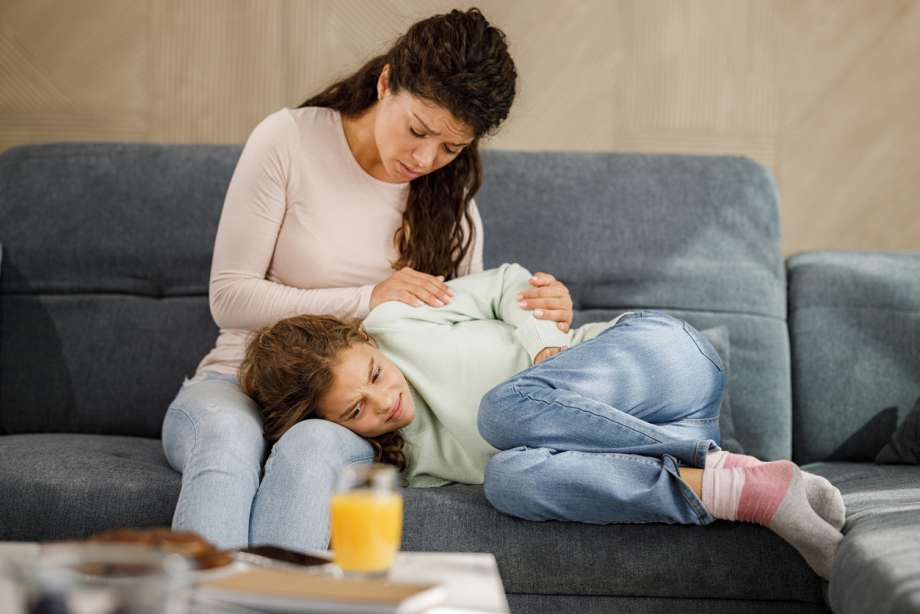Tummy Troubles: The Best Foods to Settle Kids' Stomachs

If your child comes home from school with a stomachache, or out of seemingly nowhere says their tummy hurts, there’s so much running through your brain when you hear those words.
Are they faking sick for attention? Could they have a food allergy? Is it just gas?
Are they holding in their No. 2? Should they just take a nap and let it pass? Is it anxiety?
Here’s a breakdown of what might be happening internally when your child claims their tummy hurts.
Related: How to Survive When the Stomach Flu Strikes Your Home
Preventing Stomach Aches And Tummy Trouble In Kids
“If your child has chronic stomach aches, always consider consulting your doctor first,” advises Shannon Tripp a registered pediatric nurse with emergency room experience. “However, generally speaking, bland foods can be offered — stay away from spicy, fried foods.”
It is important for parents to know that in general, a healthy child can go without food for a short period of time if they don’t feel like eating, but small frequent amounts of fluids should always be prioritized to keep them hydrated.
Speaking of fluids, according to Tripp, bone broth and chamomile tea are two excellent options to soothe a tummy ache.
“No matter what are you, or your child is, every parent should consider a high-quality probiotic,” adds Tripp. “Probiotics can help introduce good bacteria and improve gut microbiome from baby through adulthood.”
What To Do If Your Child Has Gas
Bloating, sharp pains, excessive burping, and passing gas often or with excessive force are all signs your child's digestive system is filled with intestinal gas.
“For small babies, this could be from swallowing too much air, creating gas, or simply because a baby’s digestive tract is developing,” says Tripp. “It can be helpful to give a gentle belly massage clockwise in circular motion to relieve some gas.”
Pressing gently on the tummy to pop the bubbles can offer some relief, but some kid-friendly foods are great at reducing the causes of gas at the same time.
Foods To Help Relieve Gas
- Pineapples and papayas. These fruits have enzymes that help break down proteins during the digestion process. They're also packed with vitamins and minerals and are tasty, too!
- Kefir and other probiotic yogurt drinks or chamomile tea can help with gas and bloating
- Ginger ale, ginger tea, and ginger candies can help relieve gas and the pain it can cause.
What To Do If Your Child Has Diarrhea
Diarrhea in kids can be caused by viruses, bacteria, changes in diets, problems with the intestines or some medications. If your child has diarrhea, make sure they stay hydrated until the bout passes. Some foods add bulk to the digestive system and keep them hydrated, too.
“At times, acute diarrhea can actually be helpful when the body is fighting off viruses and bacteria from illness or foods,” says Tripp. “It’s important to support your child’s digestive system and keep them hydrated with an electrolyte drink. Monitor your child for any changes in their bowel movements after illnesses, changes in diet, or medication to avoid prolonged diarrhea.”
Foods To Help With Diarrhea
If your child is experiencing diarrhea, the BRAT diet (bananas, rice, applesauce, toast) can be helpful. If the child is in severe pain, becomes dehydrated, or the diarrhea persists for a prolonged amount of time, make sure to contact your pediatrician.
Offer lightly sweetened herbal teas, broth and other clear liquids.
Make sure your child takes small sips of liquid and drinks at least 12 ounces of liquid an hour while symptoms persist.
One risk of diarrhea is dehydration which, in some cases may become severe. Sports drinks, while not usually recommended for everyday consumption by kids, can be a rare treat when a child is down with a bad bout of diarrhea.
Foods To Avoid With Diarrhea
Keep away from milk and dairy products. Milk products can worsen or bring back diarrhea symptoms. Do not give your child colas, highly sweetened juices, or caffeinated drinks, as the high levels of sugar and/or caffeine will draw nutrients and water out of the body.
What To Do If Your Child Is Constipated
If your child hasn't pooped in a couple of days and is complaining of stomach cramps or bloating, they're probably stopped up. Most kids, especially preschoolers, suffer from a cycle of constipation that starts with large and hard stools, and leads to stool withholding, resulting in infrequent stools and worsening constipation.
“One of the most common reasons children feel bloating and discomfort is due to constipation. If your child is constipated--remember kids can still be pooping and be constipated--add more fiber into their diet and encourage optimal hydration with water,” says Tripp.
Regular movement and light exercise can also help alleviate symptoms of diarrhea.

Foods That Can Help With Constipation
Fiber-rich foods like broccoli, beans, berries, nuts, and whole-grain breads can help break up the blockage over time. Give your child plenty of water to hydrate their system, too.
Look to the basic P foods: pears, prunes, popcorn, sweet potatoes, and plums to keep your child regular once the constipation bout is over.
You may also consider having your child take a magnesium supplement to help their constipation if recommended and monitored by their doctor.
Foods To Avoid With Constipation
Steer clear of white foods like cheese, milk, white starchy breads, and pasta until things are flowing regularly again.
Have your child eat fruit instead of drinking it. Fruit juices leave out the natural fibers found in fruit that add bulk to stool and push it through the body more easily.
If things don't move along in a day or two, or if symptoms get worse, call your child's doctor to see if a dose of mineral oil, fiber supplement, or laxative is necessary.
What To Do If Your Child Has Nausea
Whether it's carsickness, nausea from an illness, or something else is turning their tummy, there are many common food and ingredients that can help with nausea and vomiting.
Foods To Treat Nausea
A whiff of lemon, ginger, or mint can provide temporary relief when feeling queasy. Have your little one drink small sips of ginger ale, lemon water, lemon honey ginger tea, or mint iced tea.
Bone broth, apple sauce, plain crackers like Saltines, dry toast, and mashed potatoes can also help treat nausea in kids. Try serving a warm bowl of chicken soup, broth, or miso soup, or a fruity-flavored ice pop.
What To Do If Your Child Has Acid Reflux Or Heartburn

Acid reflux and heartburn are caused when the muscle that shuts the esophagus doesn't close properly, letting digestive acids rise back up and irritate the system. If your child feels a burning in the chest and upper stomach, especially when lying down, it could be reflux.
Reflux can occur at any age, Tripp points out but is most common in babies because babies predominantly consume liquids and spend a significant amount of time lying down. “While not always preventable, you can lessen reflux by avoiding acidic foods, and keeping your baby propped upright when possible.”
Her advice? Encourage older kids to eat smaller meals more frequently, avoid large meals before activity or bedtime, and drink water with meals and more in other parts of the day to help relieve symptoms.
Foods To Treat Acid Reflux
To soothe reflux and heartburn, feed your child a banana, almond milk, ginger tea, or black licorice-like Good N’ Plenty candies or natural licorice. Antacids like Tums are also a good option for relieving heartburn and pain from acid reflux.
Foods To Avoid With Acid Reflux
While certain foods can soothe their system, it's more important to steer clear of certain foods that cause reflux flare-ups.
Avoid the following: fast food, fatty, spicy or fried foods, citrus fruits, mint, chocolate, or caffeine. Eating smaller meals more often can also help prevent flare-ups.
What To Do If Your Child Has IBS
Irritable Bowel Syndrome (IBS) is very common in children, and unfortunately, the research doesn’t show one clear reason.
“There could be some contributing factors, such as dysbiosis (a not-ideal balance of the types of bacteria present in the digestive tract), an increased intensity of pain in the digestive tract, and chronic low-grade inflammation,” explains Alyson Martinez, a registered dietitian who works predominantly with children. “
Foods To Help With IBS
“For kids with IBS, finding opportunities to increase foods rich in fiber, vitamin D, omega 3 fats, and fermented foods are all great preventative strategies to help decrease IBS symptoms,” says Martinez.
Working with a dietitian can help you and your child find foods they’ll eat that will help improve their digestive function!
Foods To Avoid With IBS
According to Martinez, “The dysbiosis and inflammation can be related to the usual types of foods that children eat.”
Eating highly processed foods is one contributing factor, “as we know children who eat highly processed foods tend to have a lower intake of anti-inflammatory fats (such as omega 3 fats) and fiber that are shown to help minimize IBS symptoms,” she explains.
There are also some carbohydrates that are present in beans, lentils, lactose-containing foods, and artificial sweeteners that can contribute to bloating and discomfort.
Other Causes Of Stomach Pain And Bloating

Food Allergies And Intolerances
Besides gas and indigestion, food allergies can also trigger bloating in kids. If your child regularly complains of pain or bloating after eating, you may want to have them tested for potential food allergies, lactose intolerance or celiac disease.
“Research has proven that gluten causes extra inflammation in the digestive tract being the biggest culprit of intolerance – with dairy as another consideration to limit or eliminate,” says Dr. Tripp.
Anxiety
High-stress levels and anxiety are other important factors to consider when it comes to chronic belly pain. “Our brains are so closely connected to our gut and oftentimes we see a child complaining of stomach pain when the root cause may be stress-induced anxious feelings, ” explains Tripp.
If your child has so much anxiety they’re not hungry, Martinez’s advice is to avoid pressuring your child to eat large portions when they are feeling this way!
“Build small, gentle opportunities into the day to eat. I like to use what we call the ‘Rule of Threes,’ where the expectation is to eat 3 meals every day, 3 snacks every day, and not to go longer than 3 hours between eating.”
Adds Martinez: “Have low expectations for the portion that they’ll eat, and offer foods and drinks that are easy for them to tolerate. Once the peak of their anxiety has passed, focus on ways to build in more fruits, vegetables, and minimally processed fiber-rich foods into their usual eating habits, and minimize processed foods as much as possible.”
Of course, if you have any questions, run all this by your child’s pediatrician. They may recommend your child see a specialist, such as a pediatric endocrinologist.
Appendicitis
If your child is experiencing severe abdominal pains around the belly button, fever, loss of appetite or nausea, it may be a sign of something more serious than a stomachache. Many common symptoms of appendicititis in kids share symptoms with stomach flu.
According to Tripp, appendicitis is usually a localized pain in the beginning, starting near the belly button and spreading to the lower right side. “Oftentimes, with appendicitis, your child won’t be able to walk or jump. Appendicitis is also often accompanied by a fever.”
If you believe your child may have appendicitis, it is critical that you get them to the hospital as soon as possible. The appendix will usually need to be removed by an operation known as an appendicectomy or appendectomy.
Final Thoughts On Stomach Pain And Diet For Kids
Many of the best foods for kids with tummy troubles are relatively shelf-stable. Stock up on your child's favorite remedies so you'll always be prepared for whatever nature throws at you and your child!

